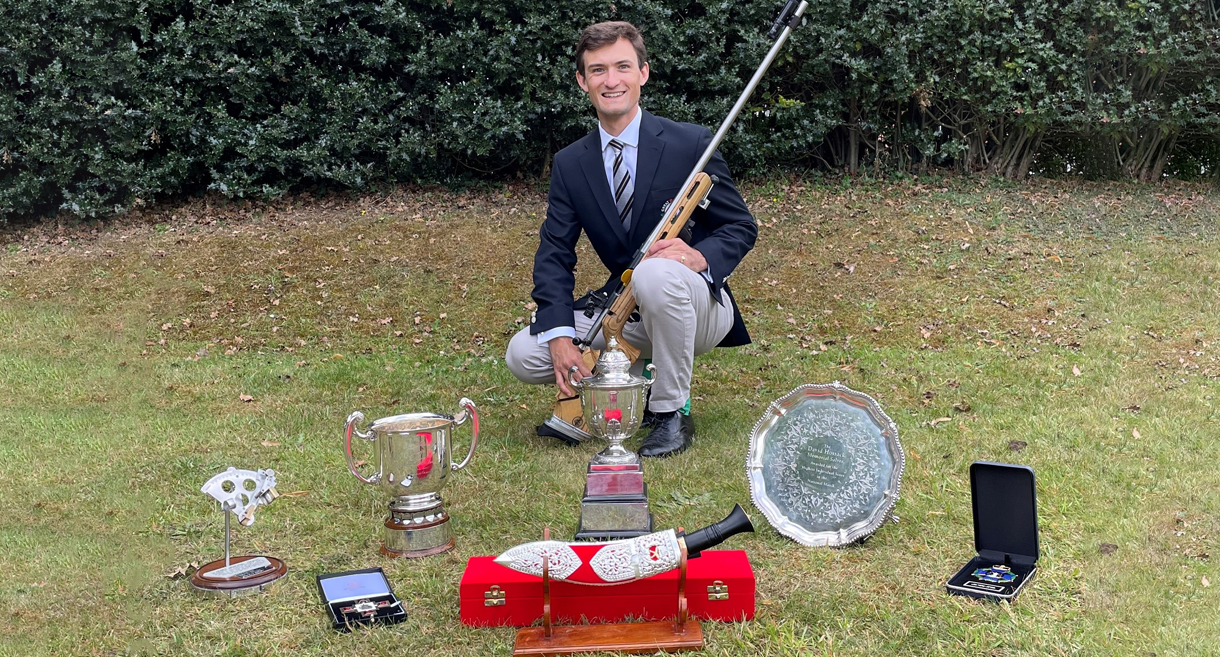-
BackWhat we doNumis is an ambitious, dynamic and innovative investment bank, driven to excel across all aspects of its delivery.Investment Banking
-
BackLatest newsRead the latest news about our business, our people and our work, find out about our next events and conferences.News
-
BackWho we areOur collaborative environment and distinctive way of excelling , is nothing without our great people.
-
BackOur board
INN Conversation with Will Broad
In our latest INN Conversation interview, we spoke with Will Broad, Associate Director on our Corporate Dealing team, about how he balances competing at international level in target rifle shooting with his demanding career, his recent successes on the world stage, and why target rifle shooting may be the ultimate inclusive sport.

Can you tell me about your journey to working at Numis?
After graduation and some short-term roles, including a stint working in Parliament, I went to work at Bloomberg on their electronic trading systems, where I discovered my interest in equity markets - and secondary markets and trading in particular.
I visited trading floors across the City as part of my role and when I visited Numis, it really stood out to me. Everyone seemed very friendly and the trading floor had a really warm atmosphere, which was so different to every other client I visited. I walked out of the building and decided I’d really like to apply there; coincidentally, a few weeks later, I got a call from a headhunter about a trading job at Numis. I was fortunate to get the role and started here in the summer of 2017, spending two-and-a-half years learning the ropes on our main trading floor before moving ‘over the wall’ to set up the corporate dealing desk within the investment bank side of our business.
What does your role involve?
I specialise in trading equities on behalf of our corporate client base, providing an ultra-high touch service for any of our clients who wouldn’t be looked after by our conventional sales trading operations (where clients are usually institutions). For example, I might support company executives who want to deal in their own listed securities, private equity clients or on share buyback situations.
Clients come directly to my team because they already have a relationship with Numis (usually as we’re their corporate broker) and they know that we’ll provide continuity and a superb level of service from front to back. My team works very closely with our corporate transaction management team to make sure any trades we perform on behalf of our clients are executed smoothly.
I really enjoy my role because I get the chance to speak to interesting people and get to know management teams at a personal level. I also really like the variety: while I spend most of my time watching the market movements on my screens, making sure transactions are executed effectively, there’s also lots of talking to clients on a consultancy basis and planning the optimal strategy for future trades, making sure everything is set up well in advance.
What is target rifle shooting, and how did you get into it?
Target rifle shooting involves shooting at paper targets at between 300 yards and 1,000 yards (just shy of a kilometre) and trying to hit the centre, taking into account various factors including the wind and weather. At 1,000 yards, for top points you are aiming to hit something the size of a dinner plate - although the target is about the size of a small family car at that distance, otherwise it would be pretty hard to see!
I first picked up an air rifle at Cubs camp at around the age of 10 and while I remember enjoying it, I didn’t think much more about it until I went to a secondary school with a combined cadet force run by a teacher with a passion for target rifle shooting. It was there I discovered I had both a passion and an aptitude for the sport. At 16, I was picked for my first Great Britain cadet team on a tour to Jersey, then at 18, after winning the national schools championships with my school team, I was selected to tour to Canada with a prestigious exchange programme between British and Canadian cadets called the Athelings in the role of GB Under 19 captain.
The next milestone was when I was selected to go on a Great Britain Under 19s tour to South Africa in 2012, and was selected to represent the main England team at Bisley that summer in my first major national fixture. I continued to compete at national level over the following years, as captain of the England U25 team and as a member of the main Great Britain rifle team to tour to the USA and Canada in 2014.
Can you tell us about some of your recent successes?
I recently participated in ten days of competitions at the annual Imperial Meeting at Bisley, one of the biggest competitions on the target rifle shooting calendar. I finished fifth in the Grand Aggregate out of over 700 competitors from around the world – the highest-ranking British competitor. I was also the winner of the St. George’s Cross (Stage I), Gurkha Appeal and Short Range Aggregate, the top scorer for the winning England team in the annual ‘National’ match against Scotland, Wales and Ireland and a member of the winning Great Britain 1st VIII in the annual ‘Kolapore’ match, defeating Australia, Canada, Germany, Kenya, Jersey and Guernsey.
It was my first time competing back at top level in a few years, so I was really pleased with how I did.
How do you balance competing at such a high level with your demanding role?
It can be tricky – my role requires prompt starts in the office for the market open, while practising at the shooting range can take up most of my weekends. You have to make a clear call on your priorities and, for me, my priority is my career, so there have been times I’ve had to let opportunities to compete go.
However, shooting is a passion for me and even at points in my life when I haven’t been able to fit in competing to a high level, I’ve still kept it up for enjoyment. While I love the competitive aspect, I do it first and foremost for the love of it. It’s a very mindful sport where you need to fully focus on your breathing, the wind and weather conditions and your surroundings – and I find that gives me a real space to unwind from my busy work life, as well as a fantastic sense of community.
Target rifle shooting and trading also have a lot of parallels – they’re both about making split second decisions, considered judgement calls based on the evidence in front of you. In each, you have a limited time to act when conditions are just right. I do think there are great synergies between the two.
Do you have any advice for anyone interested in giving target rifle shooting a try?
One thing most people probably don’t know is that target rifle shooting provides a completely level playing field for anyone who wants to give it a go. Competitors aren’t categorised by gender, age or physical ability or disability – everyone competes alongside everyone else at the same skill level regardless of other factors. As you don’t need to worry about your physicality to give it a go, it’s a truly accessible sport. People often find they do it for life – it’s not like most other sports, where you need to maintain a certain level of physicality to be able to continue.
I’d recommend anyone interested gets in touch with their local short-range rifle club first to give it a try - they’re always keen to hear from new members. And kids can get involved through Cubs, Scouts or their local cadet force.




